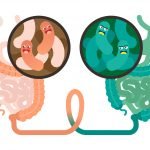NODE SMITH, ND
An antioxidant found in green tea may increase levels of p53, a natural anti-cancer protein, known as the “guardian of the genome” for its ability to repair DNA damage or destroy cancerous cells. Published today in Nature Communications, a study of the direct interaction between p53 and the green tea compound, epigallocatechin gallate (EGCG), points to a new target for cancer drug discovery.
“Both p53 and EGCG molecules are extremely interesting. Mutations in p53 are found in over 50% of human cancer, while EGCG is the major anti-oxidant in green tea, a popular beverage worldwide,” said Chunyu Wang, corresponding author and a professor of biological sciences at Rensselaer Polytechnic Institute. “Now we find that there is a previously unknown, direct interaction between the two, which points to a new path for developing anti-cancer drugs. Our work helps to explain how EGCG is able to boost p53’s anti-cancer activity, opening the door to developing drugs with EGCG-like compounds.”
Wang, a member of the Rensselaer Center for Biotechnology and Interdisciplinary Studies, is an expert in using nuclear magnetic resonance spectroscopy to study specific mechanisms in Alzheimer’s disease and cancer, including p53, which he described as “arguably the most important protein in human cancer.”
P53 has several well-known anti-cancer functions, including halting cell growth to allow for DNA repair, activating DNA repair, and initiating programmed cell death — called apoptosis — if DNA damage cannot be repaired. One end of the protein, known as the N-terminal domain, has a flexible shape, and therefore, can potentially serve several functions depending on its interaction with multiple molecules.
EGCG is a natural antioxidant, which means it helps to undo the near constant damage caused by using oxygen metabolism. Found in abundance in green tea, EGCG is also packaged as an herbal supplement.
Wang’s team found that the interaction between EGCG and p53 preserves the protein from degradation. Typically, after being produced within the body, p53 is quickly degraded when the N-terminal domain interacts with a protein called MDM2. This regular cycle of production and degradation holds p53 levels at a low constant.
“Both EGCG and MDM2 bind at the same place on p53, the N-terminal domain, so EGCG competes with MDM2,” said Wang. “When EGCG binds with p53, the protein is not being degraded through MDM2, so the level of p53 will increase with the direct interaction with EGCG, and that means there is more p53 for anti-cancer function. This is a very important interaction.”
1. Jing Zhao, Alan Blayney, Xiaorong Liu, Lauren Gandy, Weihua Jin, Lufeng Yan, Jeung-Hoi Ha, Ashley J. Canning, Michael Connelly, Chao Yang, Xinyue Liu, Yuanyuan Xiao, Michael S. Cosgrove, Sozanne R. Solmaz, Yingkai Zhang, David Ban, Jianhan Chen, Stewart N. Loh, Chunyu Wang. EGCG binds intrinsically disordered N-terminal domain of p53 and disrupts p53-MDM2 interaction. Nature Communications, 2021; 12 (1) DOI: 10.1038/s41467-021-21258-5

Node Smith, ND, is a naturopathic physician in Humboldt, Saskatchewan and associate editor and continuing education director for NDNR. His mission is serving relationships that support the process of transformation, and that ultimately lead to healthier people, businesses and communities. His primary therapeutic tools include counselling, homeopathy, diet and the use of cold water combined with exercise. Node considers health to be a reflection of the relationships a person or a business has with themselves, with God and with those around them. In order to cure disease and to heal, these relationships must be specifically considered. Node has worked intimately with many groups and organizations within the naturopathic profession, and helped found the non-profit, Association for Naturopathic Revitalization (ANR), which works to promote and facilitate experiential education in vitalism.





